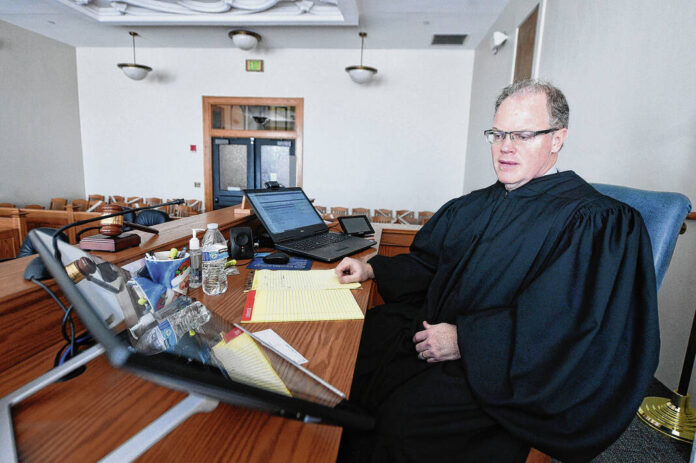
Superior Court I Judge D.J. Davis in between court. Rule 2.17 in the Code of Judicial Conduct bans any type of video or camera recording during a court hearing without approval from the Indiana Supreme Court. A recent amendment has now left the rule up to individual judges if they want cameras or video recordings inside their courtrooms.
Tom Russo | Daily Reporter
HANCOCK COUNTY — After long thought and an extensive trial period in some Indiana courtrooms, coupled with a final assessment, the Indiana Supreme Court says it’s time to let media cameras into Indiana courtrooms as soon as May 1. However, the final decision on access will be left up to each courtroom judge.
Locally, there are three official courtrooms in the Hancock County Courthouse where cases are heard — Hancock County Superior Court 1, Superior Court 2 and Circuit Court. Superior Court 1 and Circuit Court are where the more serious felony criminal cases are heard and tend to attract media interest.
Judge Scott Sirk, who oversees Circuit Court, spoke on behalf of the county judiciary and said in an email to the Daily Reporter that, pursuant to the changes to Judicial Conduct Rule 2.17, all three courts may allow media in the courtroom to film, stream and photograph court proceedings on a case-by-case basis at the court’s discretion, with a minor hitch.
Sirk noted they want the news media to make a written request to film, stream or photograph the court proceedings and to have the request filed with sufficient time to give notice to the parties so they can respond to the media’s request.
“We just want the parties to be aware,” Sirk said in an interview. “We can hear if they have an objection and then consider it, but in the end it will be up to the judge to make the final decision.”
Beginning this spring, judicial officers around the state will have the authority to allow news media into their courtrooms to record, photograph, and broadcast court proceedings as long as those proceedings are not confidential, officials from the Indiana Supreme Court announced last week in a release.
From a technical standpoint, rule 2.17 of the Code of Judicial Conduct has long prohibited broadcasting, recording, or taking photographs of court proceedings and areas adjacent to courtrooms without prior approval by the Indiana Supreme Court.
An order amending the rule goes into effect in a little more than two months and gives the discretion to allow cameras to the local judges.
“This is the culmination of years of work and pilot projects with discussion and evaluation,” Chief Justice Loretta H. Rush said in the press release. “Trial court judges are in the best position to determine how to balance the importance of transparency while protecting the rights of people involved in a court matter.”
The change follows a four-month pilot program, a public comment period and careful evaluation by the Indiana Supreme Court. Longtime work by the Indiana Judicial Conference Community Relations Committee and Court Security Committee, along with the Hoosier State Press Association and the Indiana Broadcasters Association, led to the most recent pilot project.
The judges who opened their courtrooms during the pilot — Judges Fran Gull, Marianne Vorhees, Bruce Parent, Sean Persin and Leslie Shively — provided essential feedback, officials from the Indiana Supreme Court said in the release.
Under the new rule, cameras are still prohibited in court unless authorized by the judge. Commentary included with the rule provides further conditions; for example, certain people — including minors and jurors — may not be shown on camera, only news media as defined in Indiana Code 34-46-4-1 may be authorized, and the judge may revoke authorization at any time for any reason.



